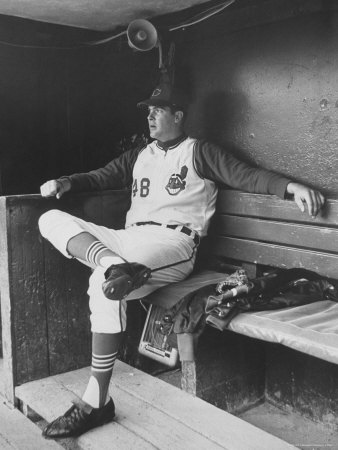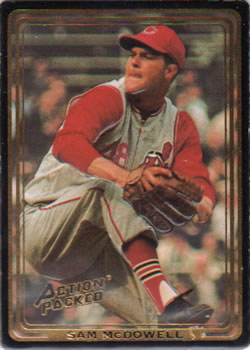 “(Sam McDowell) was a helluva pitcher. The best left-hander I ever caught.” – Cleveland Indians catcher Joe Azcue, whose big-league career spanned from 1960 through 1972.
“(Sam McDowell) was a helluva pitcher. The best left-hander I ever caught.” – Cleveland Indians catcher Joe Azcue, whose big-league career spanned from 1960 through 1972.
“It’s no fun throwing fastballs to guys who can’t hit them. The real challenge is getting them out on stuff they can hit.” – Sam McDowell, Indians starting pitcher through the 1960s.
“The only thing I get satisfaction from is accomplishing something I’m not supposed to be able to do.” – McDowell.
"A change can be an effective pitch, but only to a good hitter, to get his timing off. A bad hitter can't hit a good fastball. Throw him a change and you do him a 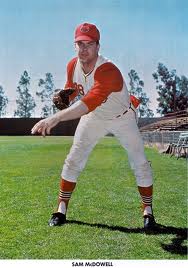 favor." -– ex-Indians pitcher, and radio announcer, Herb Score.
favor." -– ex-Indians pitcher, and radio announcer, Herb Score.
Well there it is, the dichotomy of “Sudden” Sam McDowell. Baseball historians compared his fastball to Bob Feller’s and Sandy Koufax’s. Some old-timers thought he threw faster than the legendary Walter Johnson. The puzzling, unfortunate reality was that he was reluctant to throw the heater at times.
You know how a veteran hurler is admired for becoming a “pitcher”- he has matured from the days when he was merely a “thrower”? That is not a worthy goal of a pitcher with Sudden Sam’s talent. He could throw so hard that his managers implored him to just let it loose and air it out.
Sometimes, he did. Once, early in his career, he bore down so violently that he broke a rib.
One of the demons McDowell wrestled with: he admits he was the biggest drunk in the big leagues. Many say that helped to mute his career; others consider the excessive alcohol (and amphetamines and barbiturates) as but a sign of a deeper conflict within the mind of the pitcher. We do know he considered himself foremost a football player - his father steered him to a baseball career due to the promise of bigger paychecks.
“…Sam McDowell drank more highballs than he pitched.” – Pitcher Bucky Walters.
***
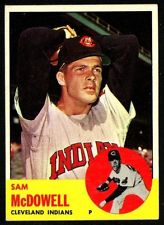 On a late summer day in 1966, Sudden Sam was at his very best on the mound. He himself later called it the “game of my life.” His fastball was never better, and he had command of each of his pitches. Let’s revisit that game, played at Tiger Stadium in Detroit.
On a late summer day in 1966, Sudden Sam was at his very best on the mound. He himself later called it the “game of my life.” His fastball was never better, and he had command of each of his pitches. Let’s revisit that game, played at Tiger Stadium in Detroit.
Sudden Sam had ‘arrived’ the year prior to this 1966 season. He had gone 17-11, with a league-leading 2.18 ERA. Earlier in this, his fifth season, he hurt his throwing shoulder and missed a stretch of games. By now, he was fully healthy.
McDowell’s opposite number was Tiger star Denny McLain. McLain’s career arc mirrored McDowell’s; he’d also come of age in 1965. He'd finished with a 16-6 record, and a fine 2.61 ERA. A budding rivalry was developing between the two pitchers, although predictably, McLain seemed to take it much more seriously than Sudden Sam.
The Indians were close to reaching the .500 mark as the season wound down. The Tigers were contenders for the World Series. The two teams had split the first two games of this weekend set.
Courtesy of baseball-reference.com, here were the starting lineups:
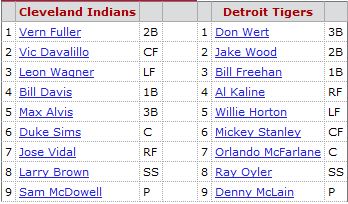
There was no score through the first three innings. The sole baserunner came on a Mickey Stanley double. Denny McLain had four strikeouts already. Sam McDowell, who’d given up the double, rang up nine versus that tough 1960s Tigers lineup. Nine strikeouts. In three innings.
“Trying to think with me is a mismatch. Most of the time I don’t know where the pitch is going.” – Sam McDowell.
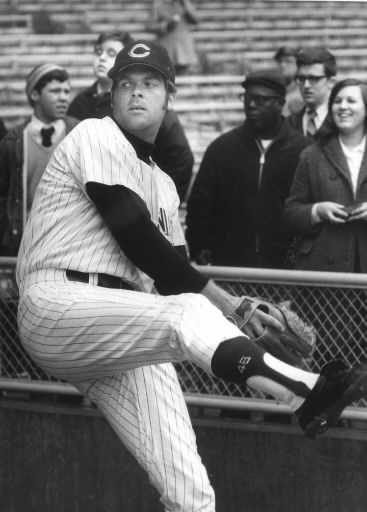 Most of the time? Okay. Today was a mismatch all right, but Sudden Sam knew exactly where each pitch was going. He was like a dialed-in power closer, only he boasted full command of four pitches. And he had plenty left in the tank.
Most of the time? Okay. Today was a mismatch all right, but Sudden Sam knew exactly where each pitch was going. He was like a dialed-in power closer, only he boasted full command of four pitches. And he had plenty left in the tank.
Even legendary umpire Emmett Ashford took notice. He heard the Tigers’ lineup talking about McDowell’s dominance that day, early and often.
Top of the 4th: Top of the order up for the Tribe. Vern Fuller got things started with a single to left. It was the first hit off McLain. Vic Davalillo flied out to center. Leon “Daddy Wags” Wagner singled to center, before Bill Davis flied out to right. First and second, two out.
Then, the Indians did some damage. In succession, Max Alvis singled to left; Duke Sims singled to center; Jose Vidal singled to left. Each base hit scored a run, and the Tribe had staked Sam to a three-run lead. Middle of the 4th, 3-0 Indians.
Bottom of the 4th: You knew the dangerous Tigers lineup could answer, even against this version of Sudden Sam. After a Jake Wood foul out to first, Bill Freehan singled to right and Al Kaline singled to center. Sam bore down and struck out Willie Horton. With two out, Mickey Stanley singled to center. Freehan scored, but Kaline was thrown out at the plate by Davalillo. After 4, 3-1 Indians. Sam McDowell was sitting on 10 strikeouts. The major league record: 18.
Top of the 5th: Fuller hit a one-out single. Davalillo stepped up, and tagged a two-run homer. Middle of the 5th, 5-1 Indians.
Bottom of the 5th: Sudden Sam whiffed Orlando McFarlane. Strikeout number 11. After a double off the bat of Ray Oyler, Jerry Lumpe came on to pinch hit for McLain. Sam got him looking. Strikeout number 12. Don Wert walked, before Sam punched out Jake Wood. Strikeout number 13. After 5, 5-1 Indians.
Wow. Sam only needed a little more than one strikeout per inning the rest of the way, to hit the all-time single-game strikeout record.
Moving to the bottom of the 6th, Sam was facing the middle of the order again. Freehan and Kaline went single-walk, but Horton sent a grounder to third. Alvis snared it, stepped on third and fired the throw to first for the 5 – 3 double play. Sam proceeded to strike out McFarlane. Strikeout number 14. After 6, 5-1 Indians.
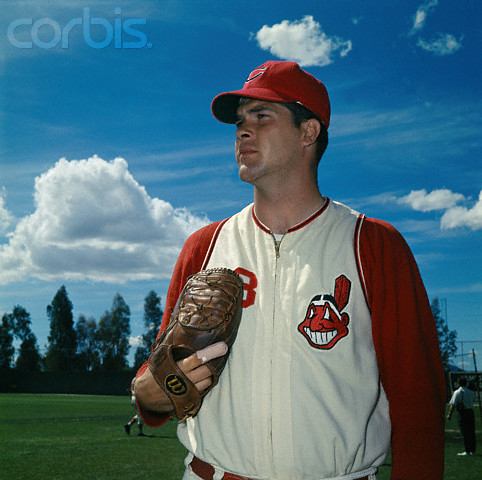 Ever since that day, Sudden Sam has maintained that he never, ever pitched better.
Ever since that day, Sudden Sam has maintained that he never, ever pitched better.
When he walked to the dugout after the sixth, McDowell had a word with manager George Strickland (who had replaced Birdie Tebbetts after the latter resigned in mid-August following a precipitous fall from first place). Sam told Strickland that his arm was feeling tight. He wanted to alert the skipper to get a relief pitcher ready, just in case.
Strickland immediately removed McDowell from the game. Again, the pitcher had had an injury earlier in the season- and he later stated in an interview that Sam actually told him he couldn’t raise his arm. So, the truth is hard to ascertain. But with three innings remaining in the game, sitting on a four-run lead, Sam McDowell only needed four more strikeouts to tie the single-game major league record. (Feller and Koufax were the only two to accomplish the feat, to that point.)
McDowell’s replacement, Jim O’Donoghue, yielded a Tigers run in the bottom of the 7th. After 7, 5-2 Indians.
Bottom of the 8th: O’Donoghue coughed up the lead. Stanley and McFarlane each had singled, and with two out in the inning, Norm Cash pinch hit for the pitcher. His drive on a McDonoghue pitch cleared the fence. Luis Tiant came on in relief and retired Wert to end the inning. Tiant, who’d been touted by former Indian Bobby Avila, was a Cuban who was just getting established in the big leagues. He’d have a nice career, pitching his first six big league seasons with Cleveland. After 8, 5-5 game.
Bottom of the 9th: Tiant retired Wood, Freehan, and Kaline- the 2, 3, and 4 hitters – all on strikeouts! The game went to extra innings.
Top of the 10th: Davalillo led the inning off with a double. Alvis laced a two-out double to plate the Indians’ center fielder. Middle of the 10th, 6-5 Indians.
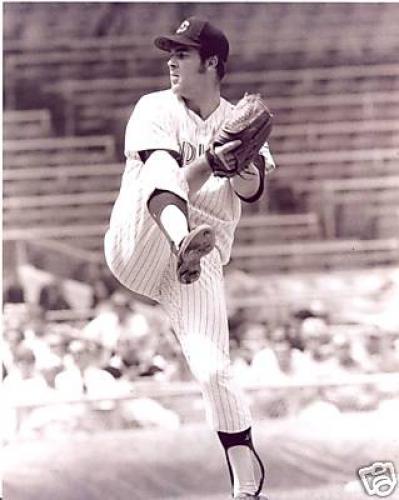 Bottom of the 10th: Tiant made the lead stand up- tacking on two more strikeouts. Indians win, 6-5!
Bottom of the 10th: Tiant made the lead stand up- tacking on two more strikeouts. Indians win, 6-5!
It was an odd victory, one shrouded in the mystery, contradictions and confusion that followed Sudden Sam around his entire career
"To be great at anything, you have to give up a lot. Some guys just don't want to make the sacrifice. They'd rather do great now and then than be great permanently." – Herb Score.
Score was one of the nicest men in all of baseball. For him to criticize a player, it meant something. He seemed to imply that Sam McDowell was a lazy slacker. After all, the term, "million dollar arm and a ten cent head" was coined in Cleveland, with Sudden Sam in mind. But was that the problem? Or was it merely a symptom of something deeper?
Sources included baseball-reference.com, Russell Schneider's Tales from the Tribe Dugout and The Cleveland Indians Encyclopedia, Wayne Stewart's The Gigantic Book of Baseball Quotations, Wikipedia.
***Hey, follow me on Twitter! http://twitter.com/googleeph2 #thanks
